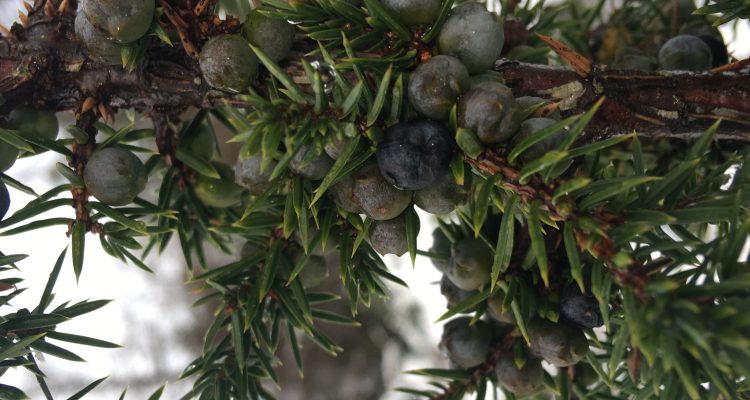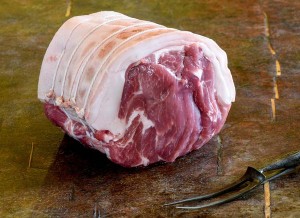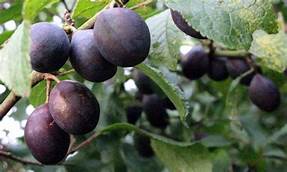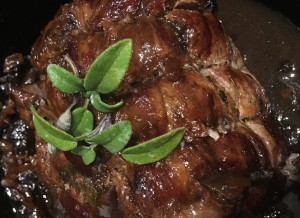
Slow Cooked Pastured Pork with Prunes and Juniper Berries.
This recipe is the drop-dead delicious and exactly the sort of warming, nutrient dense food that you will want to eat when the weather turns cold. It’s a great dish to feed a hungry family at the weekend. Even better if you can arrange a family trip to go and find the junipers in the snow like we did! It also reminded us of our damson harvesting fun in Autumn.
Slow Cooked Pastured Pork with Prunes and Juniper Berries. Serves 4/5
Ingredients:
1.5- 2kg kg Shoulder of pork boned and rolled, 1 large red onion, 1 clove of garlic, 300g of dried prunes (ideally home dried damsons or plums), 10 juniper berries, 1 tbsp Worcestershire sauce , 1 tbsp of balsamic vinegar, 1 tbsp mollases, 2 tsp chopped fresh sage.

I rarely eat pork as it’s pretty hard getting good stuff. Pigs are omnivores (eat a range of foods including animals and small creatures) rather than a herbivore (eats grass, herbs and flowers etc.) In terms of sustainable production, pork can be considered sustainable if the pigs are eating up waste foods or vegetables and supplemented with grains that have been rejected for human consumption.
A pig eating vegetables and having access to pasture will be healthier, and the meat higher in valuable nutrients. Pigs become unsustainable when incarcerated in intensive units and fed a grain-based diet – usually including GMO cereals from across the globe. Feeding pigs on just grain and especially, GMO grain, can lead to health issues which then result in a production system reliant on the routine use of preventative medications . Sadly the majority of pork sold is the latter – if the label doesn’t say organic and free range then it’s not.
Chemicals, including medications, tend to accumulate in fat as this is the bodies way of locking toxins out of harm’s way. Pork is a particularly fatty meat so it’s even more important to ensure you get your pork from an organic supplier who ideally allows the pigs access to pasture and feeds vegetables as well as grain.
If these great reasons aren’t enough to persuade you to go for better pork then please think twice before paying for – and therefore actively supporting – some of the least humane farming methods in agriculture. This recipe also works well with a haunch of venison; a much better choice if you can’t find decent pork.

If you are super organised you will have spent Autumn forraging for fruit and may have got your hands on some plums. At home we are lucky enough to have a small damson orchard and although it wasn’t a good year, we still managed to harvest a couple of buckets. For this recipe you could either use frozen plums, tinned prunes (if in syrup leave out the mollases) or damsons and plums that you have forraged and dehydrated for winter storage.

Junipers are a powerful anti-oxidant and one of the few pungent spice like flavours available to forrage through the winter in the UK. In the Lake District we have quite a few juniper stands on the fells so finding berries is relatively easy. Go for the black berries, not the less mature green ones. Although Juniper’s aren’t intenationally rare they’re an important species that needs help in the UK, please only take a few berries for an occassional recipe. Learn all about the ecological value of juniper HERE
Method:
Season the pork joint with sea salt and black pepper.
Heat up some lard in a casserole pan (ideally cast iron) and brown the pork joint on all sides to enrich the flavour.
Chop the onion then pan fry along side the pork joint until softened and going brown.
Crush the juniper berries in a pestle and mortar or with the flat of your knife and then chop into smaller pieces. Chop the garlic.
Add the junipers, prunes, garlic, worcester sauce and balsamic vinegar and mollases to the pan and add 500ml of water. Seal the casserole dish and put in the oven on a low heat. You could also use a slow cooker.
I have an aga and used the bottom over for 6 hours, if you are using a conventional oven set it to 160’C and aim for around the same time. Check every couple of hours, turn the joint over and top the water up if it’s drying out.

Perfect served with a heap of vegetables or wild rice and steamed forraged greens on the side.
Enjoy.


No Comments